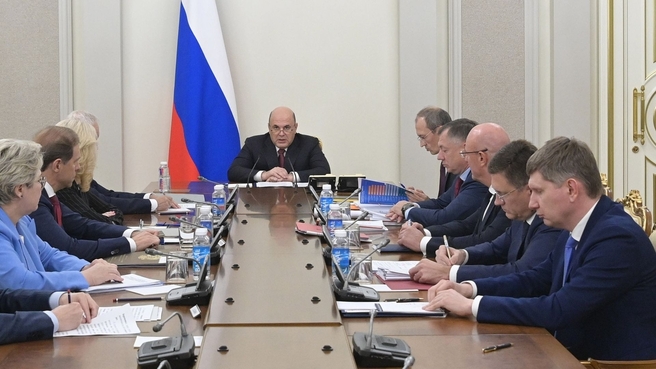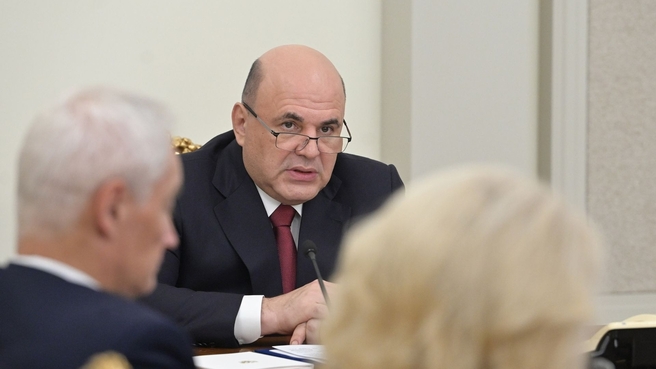The agenda: Drafting a three-year federal budget; additional subsidies for concessional loans to agricultural companies; Arkhangelsk Transport Hub development road map.
Excerpts from the transcript:
Mikhail Mishustin: Good morning, colleagues.
On Friday, as required by law, the Government submitted a draft federal budget to the State Duma. We had discussed the draft at length during a meeting of the cabinet of ministers. The budget is the country’s main financial document. It is balanced and guarantees the fulfilment of our social obligations to the people. Of course, the budget includes funding for the development of the supply-side economy, expanding infrastructure and supporting regions.
Our priority is to improve access to health care for the residents of all Russian constituent entities, as well as the construction and maintenance of outpatient clinics, ambulance stations, rural health centres, and helping patients with diabetes and cancer. In the next three years, we will allocate over 1 trillion roubles for medication supplies, including to patients with socially significant diseases and children with rare and severe illnesses.
We will pay particular attention to families with children. Substantial funds from the budget will be allocated to maternity capital, subsidising mortgage interest rates, and one-time benefits to large families wishing to pay back part of their mortgages. We will also pay a universal benefit to pregnant women and parents of children aged up to 17 years who need support.
Next year, we will continue to create new places in general education institutions. The three-year budget provides resources for that goal and for major renovation of schools, hot meals for primary school pupils and extra fees for classroom management. We also plan to finance the construction of the world-class campuses that we spoke about earlier. Construction tenders have been held.
The key goal set by the President is achieving technological sovereignty. To maintain the stability of industries, it is important to ensure a high degree of independence in developing engineering solutions and to master the production of all critically important products.
Therefore, we will provide resources for industrial development, including aircraft engineering, unmanned aerial systems, machine tool building and shipbuilding, radio electronics and modernisation of the country’s infrastructure, including roads and transport.
Colleagues,
A great deal has already been done. I want to specifically thank representatives of the State Duma and the Federation Council who were most actively involved in the pre-reading of the draft budget. The constructive proposals that were made at the meeting of the Government Budgeting Commission were taken into account when drafting the three-year budget.
Now, our next step is to thoroughly discuss the draft budget in parliament, in cooperation with deputies and senators.
I would like to ask you to ensure and supervise the personal involvement of respective federal ministries and agencies during the meetings of competent committees on the budget, and during the meetings of the State Duma Budgeting and Taxation Committee discussing state programmes.
The budget package is already under discussion. Maxim Reshetnikov presented the main aspects of the socioeconomic development forecast to the Federation Council.
It is very important to discuss the financing of key development priorities with senators and deputies. Our shared task is to communicate information about all programmes, measures and significant projects to people in the regions in the most clear and transparent way. They should not just hear figures but also see specific examples of support aimed at improving people’s quality of life and it is necessary to take note of their opinions and feedback, as the President always says.
The Government was instructed to assist colleagues from ministries and agencies with respect to the cooperation with the State Duma and the Federation Council on budgeting. Mr Grigorenko, please supervise this matter personally.
Let us move on to the next item which deals with the decision to support the agricultural sector. It has been adopted, with 5 percent preferential loans for our agricultural producers as one of its key tools. The President has stressed the need to ensure that our agricultural producers receive the funding they need on time.
For this purpose, the Government offers Russian banks and state development corporations federal budget subsidies to enable companies to raise considerable funds. Over the past three years, the annual total amounted to about 1 trillion roubles. This figure includes short-term one-year loans for seasonal agricultural work, such as planting and harvesting, as well as funding for investment projects in the agricultural industry with maturity periods ranging from 2 to 15 years. Last year alone, companies signed over 28,000 loan agreements under these terms. However, banks temporarily stopped granting these loans after the Bank of Russia increased its key interest rate to 13 percent.
The Government will provide additional support to the agricultural sector so that its companies can once again apply for preferential loans as quickly as possible. During the previous Government meeting, we already allocated 45 billion roubles in order to achieve this. We have drafted another directive to allocate 10 billion roubles for this purpose. With a total of 55 billion roubles, this effort will make it possible to subsidise at least 40,000 preferential loans.
The decisions we take will not only help agricultural producers to service their existing obligations, but also to undertake new projects and produce more commodities and food, as well as to ensure that people in Russia can choose from a wide variety of high-quality Russian products.
Moving on to the next item, the Government is continuing its system-wide effort to develop the Northern Sea Route.
The President has emphasised that this is a major strategic priority for us. The route forms an important transport corridor linking Vladivostok and Arkhangelsk, Asia and Europe, and lies within Russia’s territorial waters and exclusive economic zone. It allows cargo owners to choose whether to send their goods west or east, depending on their needs, a factor which has become especially relevant today with the ongoing transformation of logistics chains and which can play a decisive role as far as our national security is concerned.
Drafted last year as per the Presidential instructions, the Northern Sea Route Development Plan covers a period until the mid-2030s. We have drafted a roadmap to develop the Arkhangelsk Transport Hub, considering the key role it plays in the Arctic. Last, year, it handled over 6.5 million tonnes of cargo, including timber products, oil and petrochemicals, and all other products needed to supply the northern territories.
This comprehensive plan provides for the creation of a deep-water section and a terminal for zinc-lead concentrate, improving gas and energy supplies, widening the waterways along the Dvina and Pechora rivers, as well as approaches to major enterprises by water, rail and road, upgrading and creating new research centres and vocational training schools.
The digital transition in the navigation sector and a new diesel icebreaker project will help ensure uninterrupted navigation.
All this will substantially strengthen the transport framework in Russia’s northwest. We expect shipments through the port of Arkhangelsk to at least triple by the end of the next decade. This would pave the way for the implementation of several major industrial projects, and the creation of new jobs at hundreds of enterprises around the country that will contribute to setting up and operating new shipping and manufacturing capabilities.













